Pro-Kremlin media provided simultaneous coverage after Putin shared a story about a former colleague dying from COVID in Latvia
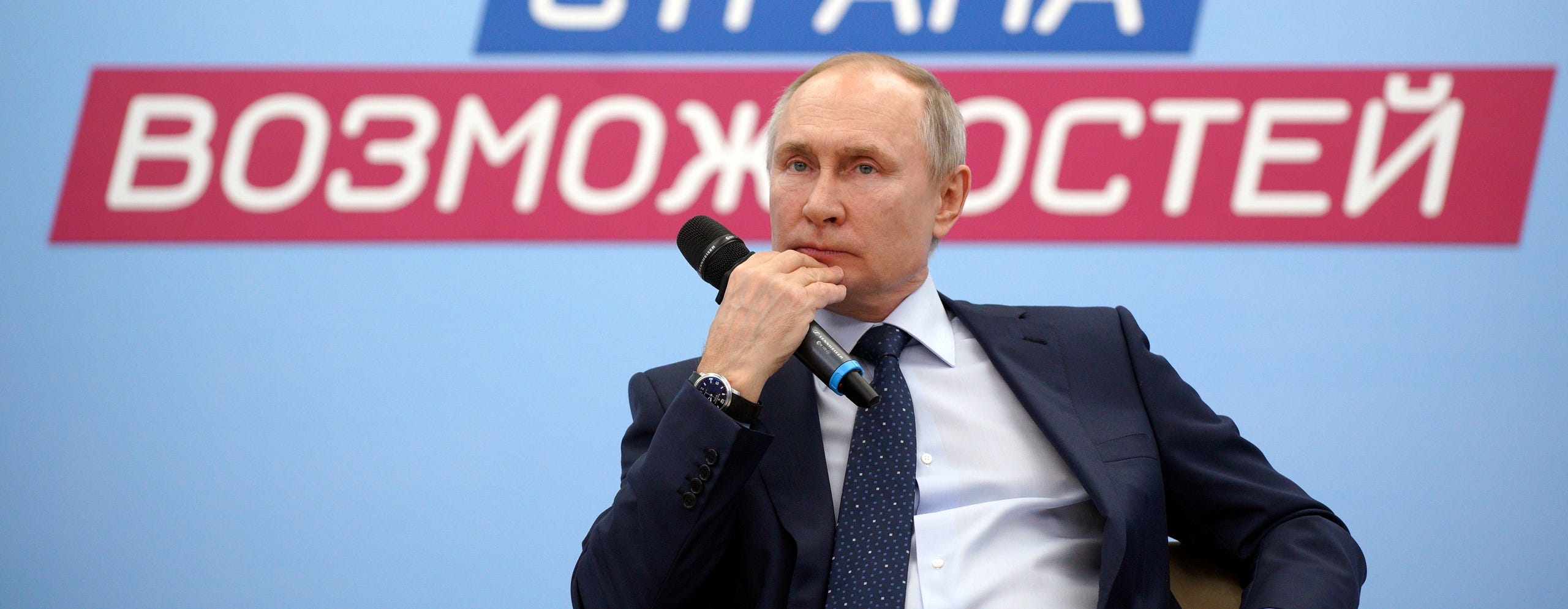
By Nika Aleksejeva
A personal anecdote by Russian President Vladimir Putin about a “former colleague” who died from COVID-19 in Latvia prompted a near simultaneous media blitz in pro-Kremlin outlets questioning the quality of the Latvian health system.
The COVID-19 pandemic has tested the capacity of healthcare systems globally. Latvia was initially very successful in dealing with the first wave of COVID-19 in Spring 2020, but the second wave in Fall 2020 hit harder, with the disease overwhelming most hospitals throughout the country.
Since October 2020, Latvia has had a lower COVID-19 case mortality rate than Russia, according to Johns Hopkins University’s COVID-19 database. Pro-Kremlin outlets have claimed throughout the pandemic, however, that the Baltic states are not handling the pandemic well without Russia. These claims support a recurring narrative in Kremlin-controlled media that the Baltic states suffer due to their strained relationship with Russia.
The story of Putin’s colleague
On March 26, Kremlin-owned television channel Rossiya 24 aired a live broadcast with Vladimir Putin from a forum hosted by a nonprofit organization called Russia — The Country of Opportunities (RSV in Russian), which Putin himself founded in 2018. During the broadcast, Putin told a story about his “former colleague” who died from COVID-19 in Latvia. Putin said that there was no MRI machine in “the main Latvian infection center,” only an old x-ray machine that could not show the extent of the person’s lung damage.
“There was no medicine, nothing,” Putin said. “We offered to take him to Moscow. We did everything to take him away — we could not. The man died. This is the level of organization, including healthcare.”
Putin did not mention the name of his former colleague, but Latvian media was quick to remember that on November 15, 2020, the Latvian investigative journalism TV show “Neka Personiga” reported the death of Yevgeniy Roldugin, a former long-time employee of Gazprom, the Russian national gas company in Latvia, and a former classmate of Putin at the KGB academy. Yevgeniy’s brother, Sergei Roldugin, is considered to be in control of Putin’s financial assets secured in various offshore companies, according to the Panama Papers investigation by journalists at the OCCRP. “Neka Personiga” reported that a Russian medical transport plane landed at Riga Airport on November 2, 2020 and “was there for a few hours.” Aigars Kalvitis, the head of Latvijas Gaze, a Latvian national gas company, confirmed that a plane came for Roldugin, but he died and was buried on November 4.
It is accurate, as Putin claimed, that there is no MRI machine in “the main Latvian infection center,” or the Latvian Center of Infectiology, which is part of Riga East Clinical University Hospital , or RAKUS. But this fact alone does not accurately reflect the overall quality of the Latvian healthcare system. As Ilga Naminiece, the representative of the RAKUS hospital, explained to the Russian version of popular Latvian news outlet Delfi, all COVID-19 patients go to the Clinic for Emergency Medical Care and Patient Admission “where they get all necessary examinations — if necessary, magnetic resonance imaging, computed tomography or x-rays.” Then, after all medical examinations are completed and the patient receives a diagnosis, they are sent to one of the hospitals, including RAKUS. “An MRI is not done every day, and all intensive care units have everything to constantly monitor lung condition,” Naminiece said in the interview.
Putin singles out Latvia
Putin told the story about Roldugin’s death in Latvia after Alina Gerlinya, the deputy editor-in-chief at the Kremlin-owned outlet Baltnews Latvia, shared that she was raised in Latvia, but decided to study in Russia, where she also became a part of the Leaders of Russia program at RSV. She confessed to Putin that it is hard for immigrants to settle in Russia, and suggested a separate track within the Leaders of Russia program for immigrants. Before addressing Gerlinya’s suggestion, Putin decided to share the unrelated story about Latvia’s handling of COVID.
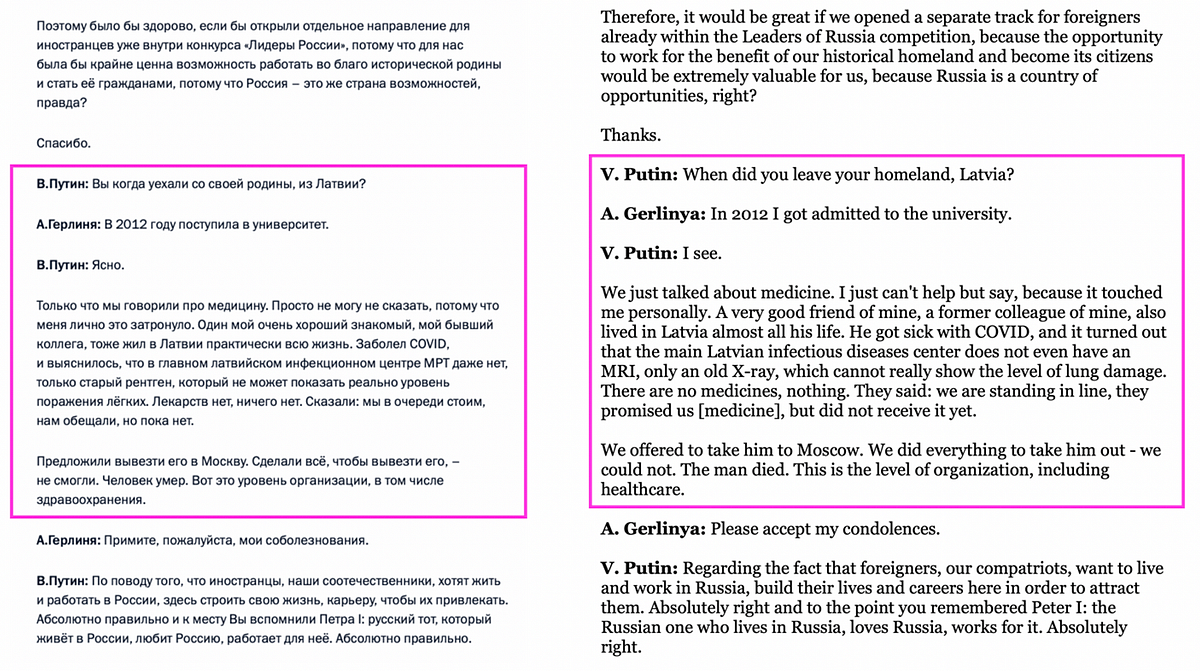
The story about Putin’s comments regarding the Latvian healthcare system made headlines in Kremlin-owned and pro-Kremlin media almost immediately. The event was streamed live on the Kremlin-owned TV Rossiya 24 YouTube channel. The broadcast started at 14:05 Moscow time and ended at 16:26 Moscow time, according to the YouTube Metadata online tool. The moment Putin started his answer to Gerlinya about Latvia was around 14:41 Moscow time, a YouTube video timestamp suggests.
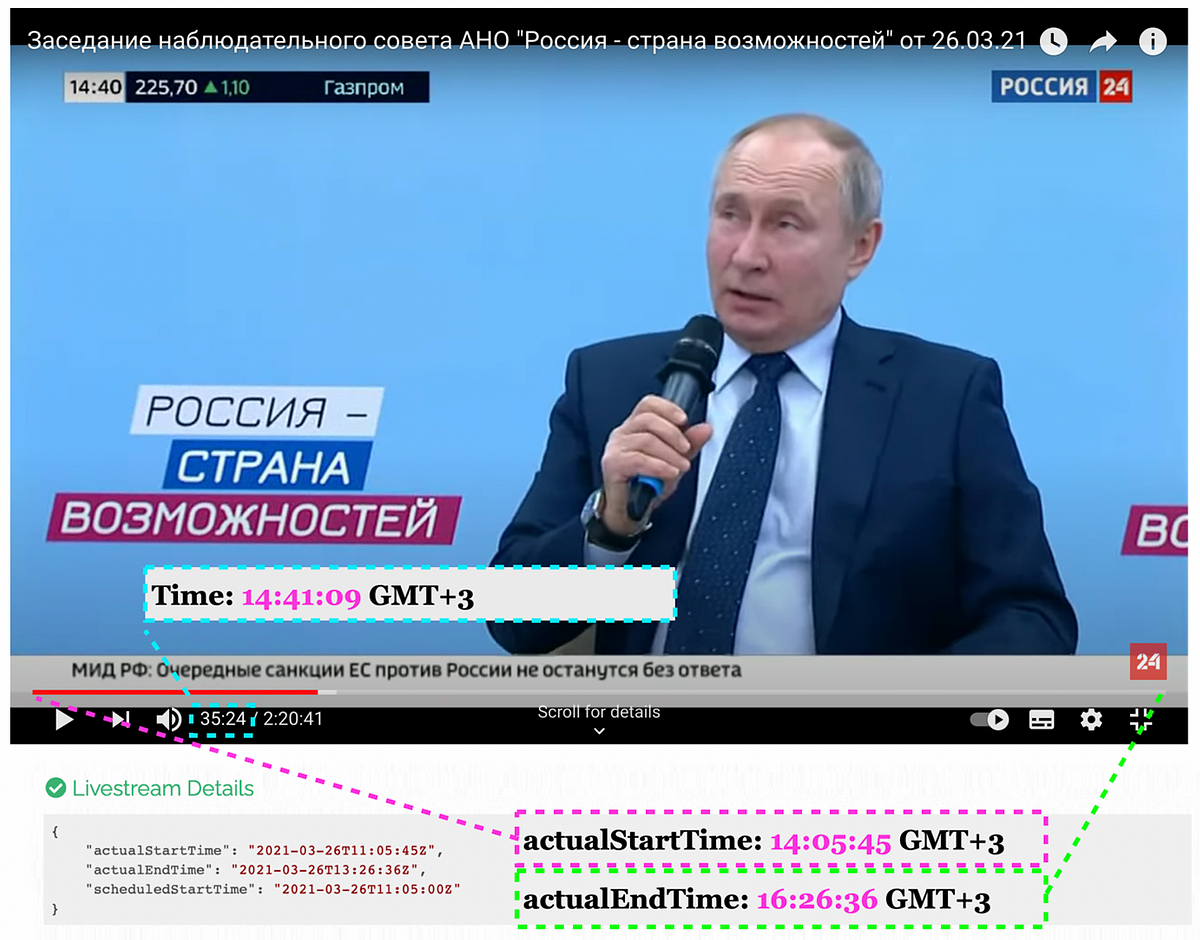
The DFRLab identified 38 articles on Russian media in Russian about the event; 20 articles were posted during the event itself. The first article appeared 21 minutes after Putin started telling the anecdote on Life, a pro-Kremlin media outlet suspected of being under Kremlin control.
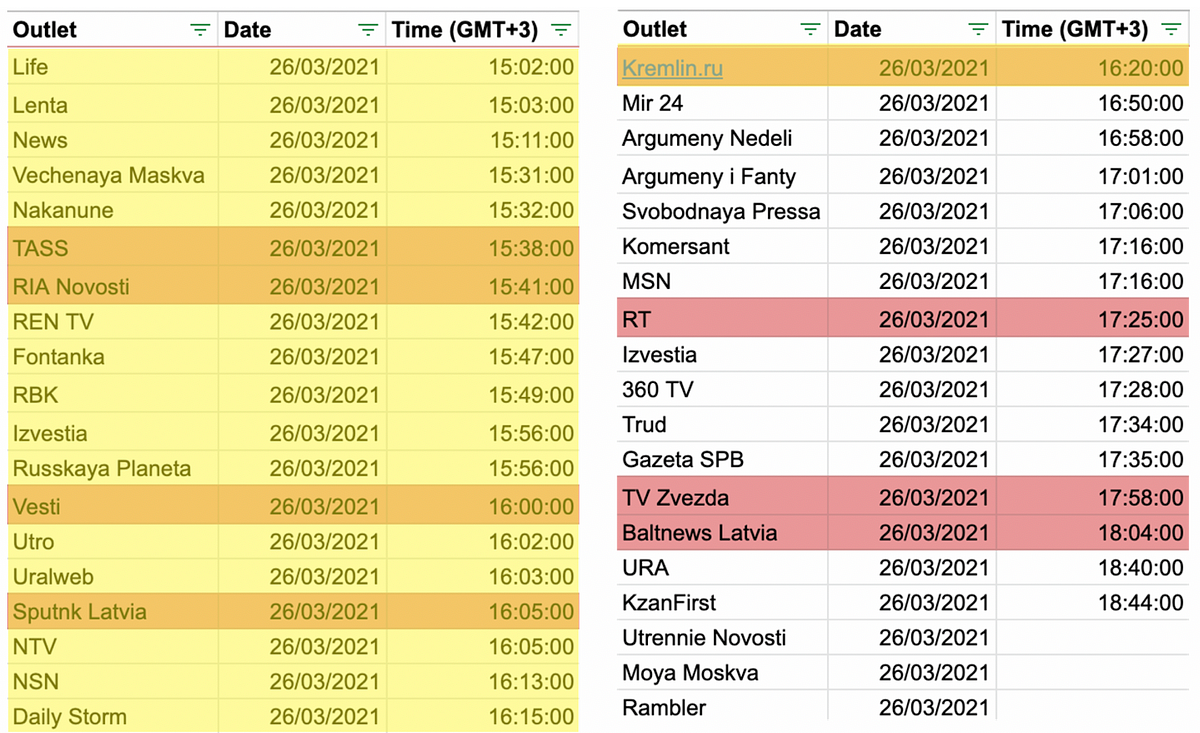
Putin’s inclusion of the anecdote, and pro-Kremlin media’s almost simultaneous amplification of it, indicates that this media coverage may have been aimed at undermining confidence in the Latvian healthcare system. It also shows the extent to which Putin’s words can echo through the pro-Kremlin media ecosystem.
Response by Latvian media
The first media outlet that brought the story to a Latvian audience was BB.lv, a pro-Kremlin outlet in Latvia. It copied the story from pro-Kremlin Russian outlet Lenta.ru and published it six minutes after Lenta.ru’s article went live. The only original content on BB.lv was an insert about Yevgeniy Rolduging being the colleague Putin mentioned in the story.
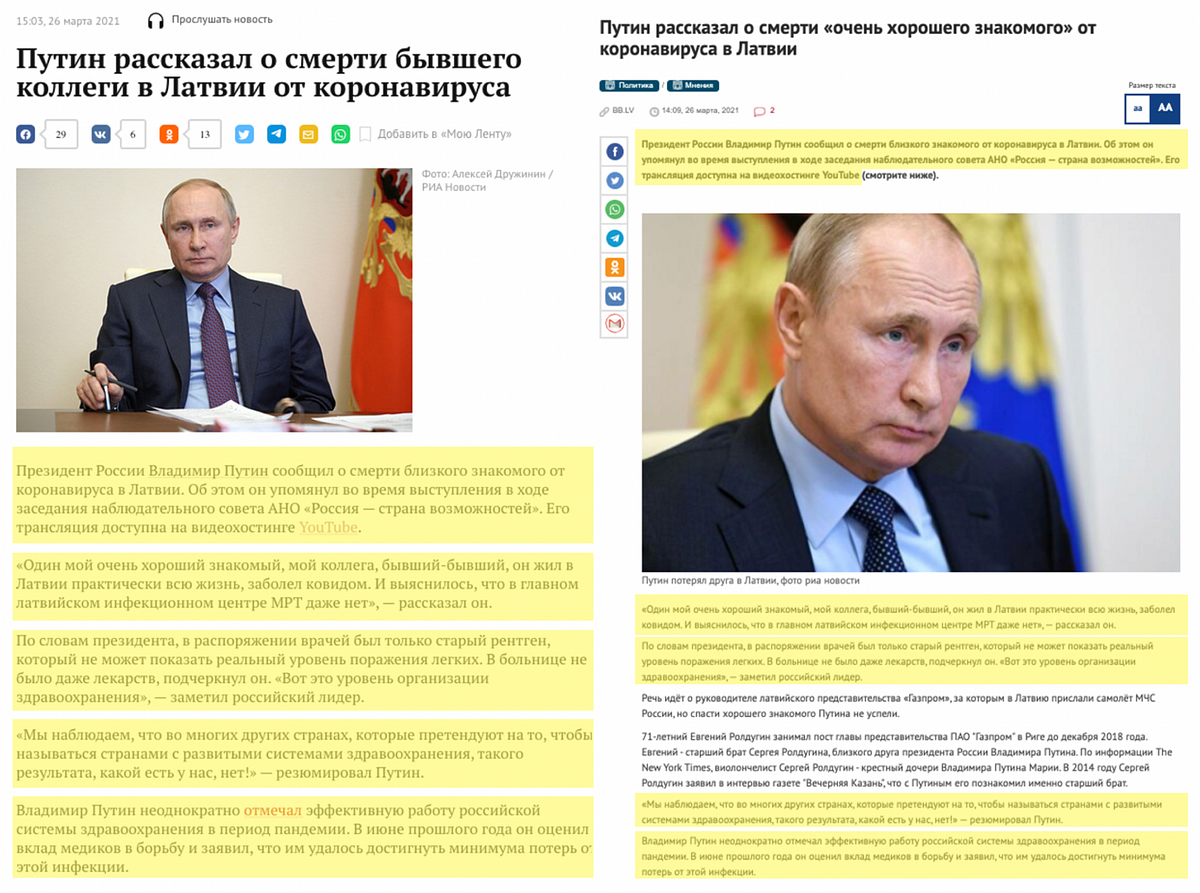
Other Russian-language media outlets in Latvia that picked the story up from Lenta.ru were the Russian version of Delfi.lv, the Russian version of Latvian tabloid Jauns.lv, and Russian media outlet in Latvia Press.lv.
The only two Latvian-language media outlets that retold the original story were the tabloid Jauns.lv and a local version of Sputnik Latvia. Later, on March 30, Jauns.lv published a fact-check in both Latvian and Russian concluding that Putin told “plain lies.” Delfi.lv published a fact-check in Russian two hours after the initial story appeared on Delfi.lv, on March 26. LSM, the public broadcaster, published the fact-check in Latvian three hours after the story on BB.lv started to circulate in Latvia.
Other developments
The next day, Janis Dombrava, a Latvian nationalist politician, tweeted a photo of an MRI machine he claimed was at a hospital in Jekabpils, the city where Roldugin lived. “The President of the Russian Federation spoke about medicine in Latvia,” the tweet stated, notably in Russian rather than Latvian. “He said we don’t have an MRI. This is the MRI office in Jekabpils, where Putin’s friend lived. Jekabpils has 22,000 inhabitants, about 150km from the capital. I hope that small towns in Russia also have such diagnostic rooms.”
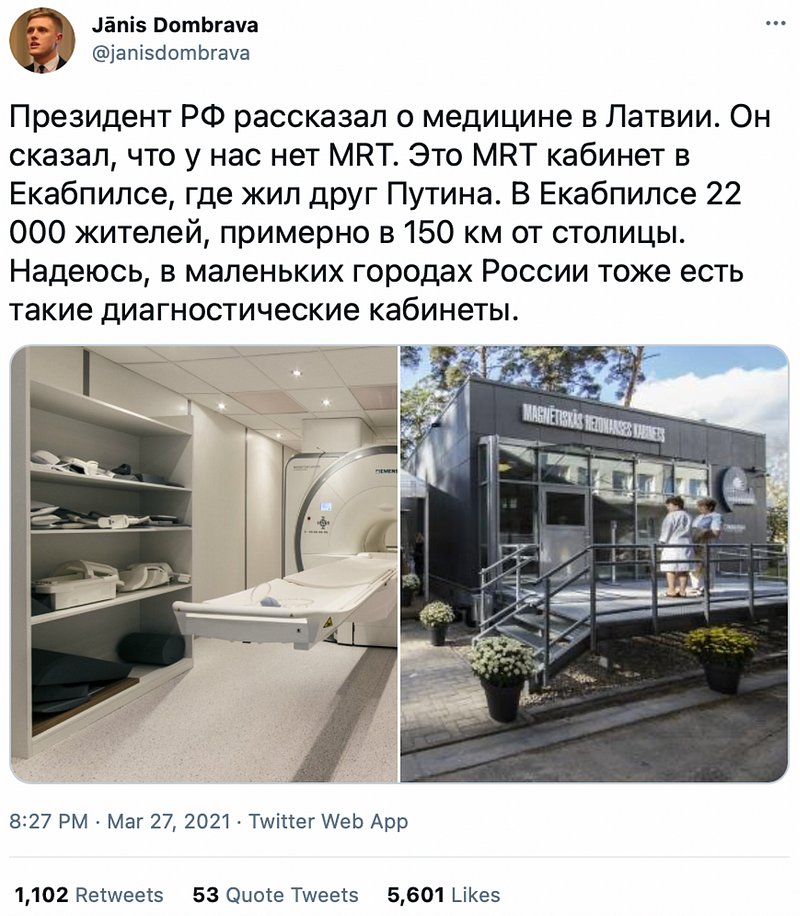
This tweet triggered a response in the Russian-language media. The first piece that referenced Dombrava’s tweet was published on BB.lv. Then, Sputnik Latvia published an article in Russian titled, “To reach Putin: Dombrava started talking in Russian while proving that Latvia has MRI.” Later, Donbas Segodnya, an outlet in Donbas, the part of Ukraine that is under Russia’s control, published a story claiming that people on social media disputed Dombrava’s tweet. In fact, replies on Twitter were mixed. There were many Twitter users, however, who complained about bad healthcare conditions in Russia, users who defended the Latvian health system, and users who criticized it.
Finally, on March 29, Dariya Grigorova, a correspondent at the Kremlin-owned TV channel Russia 1, reported on the show “60 Minutes” that Putin’s story “triggered an information wave” in Latvia. She explained that RAKUS hospital indeed has an MRI machine, but its Center of Infectiology does not. She also mentioned that “many social media users” publicly complained about the Latvian healthcare system, but omitted that there were also many who defended it. Grigorova also mentioned Dombrava’s tweet, emphasizing that he “posted an answer in Russian, which he had never done before.”
Nika Aleksejeva is a Research Associate, Baltics, with the Digital Forensic Research Lab.
Cite this case study:
Nika Aleksejeva, “Putin anecdote prompts pro-Kremlin media blitz about Latvian healthcare system,” Digital Forensic Research Lab (DFRLab), April 5, 2021, https://medium.com/dfrlab/putin-anecdote-prompts-pro-kremlin-media-blitz-about-latvian-covid-19-response-a4d10b091251.
Follow along for more in-depth analysis from our #DigitalSherlocks.

